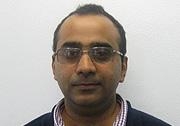Win for research pioneer
Rising research star, Associate Professor Nagarajan Valanoor, has been recognised for work which "puts Australia on the world map" in advanced materials development.
Rising research star, Associate Professor Nagarajan Valanoor, has been recognised for work which "puts Australia on the world map" in advanced materials development.

Rising star in materials research, Associate Professor Nagarajan Valanoor, has won the Royal Society of NSW's prestigious Edgeworth David Medal for 2009 for work which has "put Australia on the world map" in advanced materials development.
Associate Professor Valanoor, of the UNSW School of Materials Science and Engineering, researches in the area of ferroelectric thin films.
The holder of an ARC Australian Research Fellowship said his win was a credit to the work of his students, whom he wants to help become the science "stars of tomorrow".
The Edgeworth David Medal is given in recognition of outstanding achievement by a scientist under the age of 35 and Associate Professor Valanoor, better known at UNSW as Nagy, is the second UNSW researcher to win the accolade in as many years. The 2008 medal was awarded to Dr Adam Micolich, a senior lecturer in the UNSW School of Physics.
In its award citation, the Royal Society said Associate Professor Valanoor had put Australia on the world map as a source of leading research in his field. He has published over 60 peer-reviewed papers internationally which have been cited over 2,400 times, a remarkable achievement for a young researcher.
"Nagy is an outstanding young experimental scientist working in the area of nano-scale functional materials and thin film polar oxide structures," said Professor Les Field, UNSW Deputy Vice-Chancellor, Research, in his nomination.
"Nagy has, without exaggeration, put Australia on the world map in terms of leading edge research in polar oxides, and will undoubtedly chart the road map for this discipline nationally over the coming decades."
Associate Professor Valanoor leads a project that is searching for new, environmentally friendly, lead-free piezoelectric ceramics, which can be used in a wide range of unique applications including microphones and speakers in mobile phones, microelectronic devices, actuators in car fuel-injection systems and sonar transducers for submarines and undersea mineral exploration.
Associate Professor Valanoor said the win was "most fulfilling", citing the strong role of his students in aiding his success in the award.
"My students have been my greatest asset," he said.
"From a philosophical perspective, I want to create tomorrow's stars. So I make sure all of my students go through a very rigorous thinking process. I am fortunate it has mostly worked so far."
Media Contact: Bob Beale | 0411 705 435 | bbeale@science.unsw.edu.au